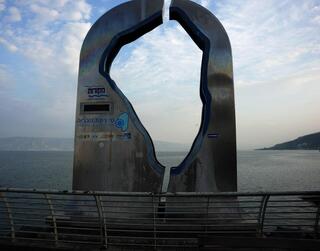Authorities are currently summing up the dry winter season and concluding that, in light of global warming and the need to ensure a steady water supply for Israeli residents and neighboring countries, it is necessary to develop strategies to address how heatwaves or flooding along the coastline might affect infrastructure facilities across the country, as well as water resources and the entire water supply system. The Sea of Galilee is not doing particularly well after a very dry winter ( Video: Igud Arim Kinneret ) According to the company’s year-end report for 2024, household water consumption increased by about 2.5%, while agricultural usage surged by nearly 9%.
Looking ahead to 2025, the lack of precipitation has already lowered the water level in the Sea of Galilee (Kinneret) by approximately 4 inches this month, a situation that has not been seen in the water sector for a long time. The report highlights that rising temperatures and reduced rainfall are expected to increase the frequency of drought events in the Middle East, including in Israel. This could also reduce the availability of groundwater in both Israel and its neighboring countries.

Additionally, Israel's high population growth will further drive up water demand. The Ministry of Energy and Infrastructure has already warned in its recently released climate change preparedness plan that, without early preparation, there could be challenges in ensuring a regular supply of fresh water for consumers in the future. One of the key conclusions from the Mekorot report is that climate change necessitates integrating the climate emergency into the long-term operational plans of the national water company.
Mekorot states that it began managing climate risks about three years ago by developing an innovative work model that deeply examines the potential impacts of extreme heat scenarios on the company’s facilities and the water supply chain. This model was developed with the assistance of Dr. Amir Givati, head of the Meteorological Service, and the consulting firm Entropy.
It is unique among government companies that provide essential services and operate under emergency frameworks. Practical implementation of the model So what does the model actually show? Every employee can map out the infrastructure in their workspace that may be vulnerable to the impacts of climate change. The model has been translated into a digital map, enabling each worker to identify which facilities are at risk, how heatwaves or flooding might affect water supply capabilities, and how to prepare accordingly—whether through regular maintenance or future planning and upgrades for pipelines, drilling, or capacity expansion.
2 View gallery Sea of Galilee ( Photo: Effi Shrir ) Riki Mor, Head of Corporate Responsibility at Mekorot, shared that the company made significant progress last year in preparing for extreme climate changes, whether it be heatwaves, floods, or the depletion of natural water resources. Get the Ynetnews app on your smartphone: Google Play : https://bit.ly/4eJ37pE | Apple App Store : https://bit.
ly/3ZL7iNv “We have built a unique model that examines the implications of climate change decades into the future. Israel is warming, and we are in an era of extreme climate change, where scenarios may include increased heat and longer heatwaves, droughts and drying seasons, wildfires, storms, flooding, and rising sea levels,” said Mor. “These scenarios have numerous implications for Israel’s water resources, some of which may even impact our ability to supply water, reduce natural water sources, and affect water quality.
” Key projects to ensure Israel’s water future Several critical projects are underway to secure Israel’s water sector. These include linking the Negev to fresh water through a master plan project, which has been approved and is currently being executed. Additional projects include a plan to connect eastern valleys and a project to extend water pipelines up to the Upper Galilee.
New desalination facilities in the Western Galilee and Emek Hefer are also being connected, alongside a decade-long national plan for ground drilling. 2 View gallery Ayun Stream is drying up ( Photo: Avihu Shapira ) Gal Stahl, Chairman of Entropy, who worked with Mor on developing the model, explained that this is a groundbreaking and unique project to operationally prepare the company. “Global financial institutions and regulatory bodies in Israel and worldwide are strengthening the requirements for climate risk management and environmental reporting,” he said.
>.
Environment

As climate change rages on, Israel prepares for a future of severe drought

Water authority warns that reduced rainfall will increase drought events, straining water resources, challenging a growing population; plans desalination and infrastructure upgrades, to secure the country’s water future















